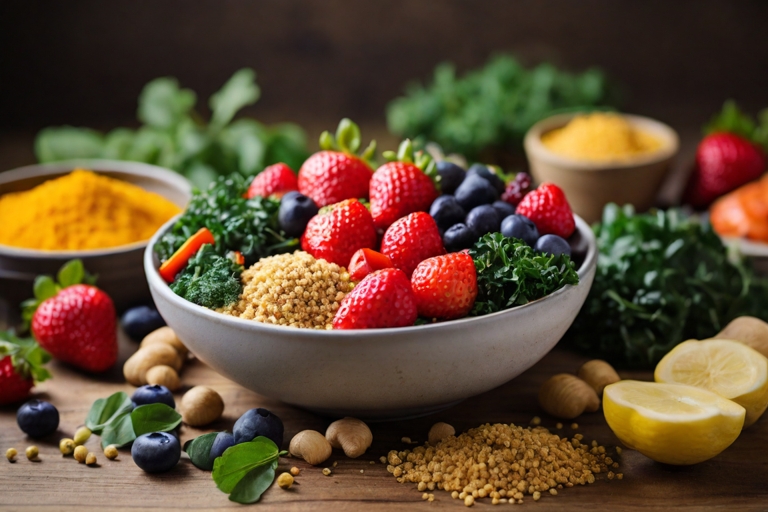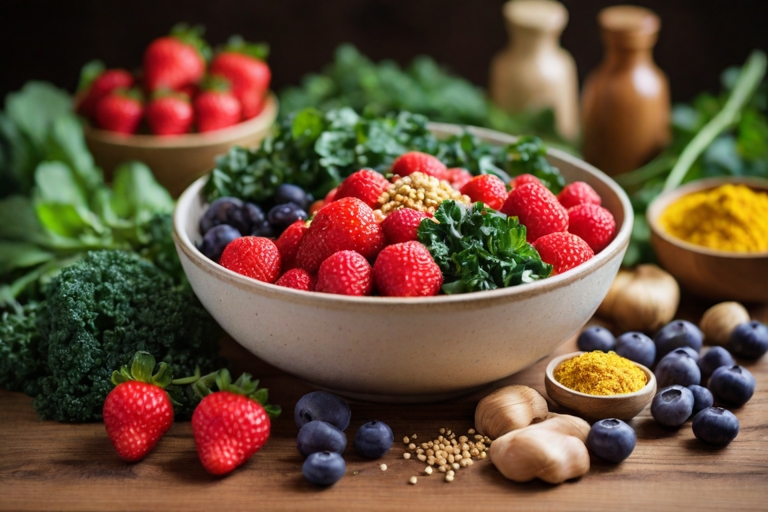Table of Contents
Inflammation is a silent culprit that often goes unnoticed until it begins affecting your daily life. Whether you’re feeling sluggish, dealing with constant joint discomfort, or simply not feeling your best, chronic inflammation can have far-reaching effects on your health. The good news is that the power to fight back lies within the food you eat. With the right anti-inflammatory dinners, you can lower your body’s inflammation, enhance overall wellness, and feel your best every day. This article is designed to show you how anti-inflammatory dinners can transform your health and provide simple, delicious, and easy-to-make recipes to incorporate into your life.
What Are Anti-Inflammatory Dinners and Why Are They Important?
Before diving into the best recipes and ingredients for anti-inflammatory dinners, it’s important to understand why they matter so much for your health.
Understanding Inflammation
Inflammation is a natural response by your body to fight off infections, repair injuries, and protect against harmful substances. There are two types of inflammation: acute and chronic. Acute inflammation is a short-term response to injury or infection, such as when you cut yourself and the area becomes red and swollen. On the other hand, chronic inflammation can persist over time and lead to health problems like arthritis, heart disease, and even cancer.
What many people don’t realize is that the food you consume plays a significant role in the inflammation process. The right foods can either exacerbate inflammation or help reduce it. By choosing meals rich in anti-inflammatory ingredients, you can proactively lower the levels of chronic inflammation in your body.
The Benefits of Anti-Inflammatory Foods
When you incorporate anti-inflammatory dinners into your diet, you’re not just fighting inflammation—you’re actively improving your health in multiple ways. Here are just a few of the benefits:
- Strengthened Immune System: Anti-inflammatory foods help enhance your body’s ability to fend off illness and infection.
- Reduced Pain and Joint Discomfort: Chronic inflammation often leads to joint pain, which can be alleviated with anti-inflammatory meals.
- Improved Digestion: Many anti-inflammatory ingredients are rich in fiber and enzymes that aid digestion, making it easier for your body to absorb nutrients and eliminate waste.
- Better Brain Function and Mood: Research suggests that inflammation can negatively impact cognitive function and mental health. Anti-inflammatory foods may support brain health and improve mood.
- Weight Management: Chronic inflammation is linked to obesity, and eating an anti-inflammatory diet can support healthy weight management by promoting fat loss and muscle preservation.
Key Nutrients in Anti-Inflammatory Meals
To fight inflammation effectively, you need to focus on the right nutrients. Here are some of the most powerful anti-inflammatory elements you can include in your dinners:
- Omega-3 Fatty Acids: Found in fatty fish like salmon and mackerel, these fats are known for their potent anti-inflammatory properties.
- Antioxidants: Berries, leafy greens, and other colorful vegetables contain antioxidants, which help neutralize harmful free radicals in the body.
- Polyphenols: These plant compounds are found in foods like olive oil, green tea, and dark chocolate and are known for their anti-inflammatory effects.
- Fiber: Whole grains, legumes, and vegetables are all high in fiber, which can help reduce inflammation by promoting healthy gut bacteria.
By including these ingredients in your meals, you’ll provide your body with the necessary tools to fight inflammation and promote overall health.

Best Anti-Inflammatory Ingredients to Include in Your Dinner
Now that you understand the importance of anti-inflammatory foods, let’s take a closer look at some of the top ingredients to include in your dinner recipes. These ingredients are easy to find, versatile, and incredibly nutritious.
1. Turmeric and Ginger
Both turmeric and ginger have been used for centuries in traditional medicine due to their anti-inflammatory properties. Turmeric contains an active compound called curcumin, which has been shown to reduce inflammation in the body. Ginger, with its potent bioactive compounds, works in a similar way to help alleviate pain and inflammation.
How to Use: Add turmeric and ginger to soups, stews, smoothies, or even stir-fries for an extra flavor boost and inflammation-fighting power.
2. Leafy Greens
Leafy greens like spinach, kale, and Swiss chard are packed with antioxidants, vitamins, and minerals that support the body’s anti-inflammatory processes. These vegetables are rich in vitamin K, which plays a role in regulating inflammation.
How to Use: Use them in salads, smoothies, or lightly sauté them with garlic and olive oil for a nutritious side dish.
3. Fatty Fish
Fatty fish, such as salmon, mackerel, and sardines, are rich in omega-3 fatty acids, which have been shown to reduce inflammation and support heart health. These essential fats are not only anti-inflammatory but also great for your brain and joint health.
How to Use: Grill, bake, or pan-sear fatty fish for a satisfying dinner that’s packed with nutrients.
4. Berries
Berries like blueberries, strawberries, and raspberries are rich in antioxidants, specifically anthocyanins, which have powerful anti-inflammatory effects. Berries also contain vitamin C, which helps boost the immune system.
How to Use: Add berries to yogurt, oatmeal, or smoothies, or enjoy them as a snack after dinner.
5. Nuts and Seeds
Nuts and seeds, such as walnuts, chia seeds, and flaxseeds, provide healthy fats, protein, and fiber. These foods are also rich in anti-inflammatory compounds that support overall health.
How to Use: Sprinkle nuts and seeds on salads, smoothies, or baked goods, or enjoy them as a snack.
Anti-Inflammatory Dinner Recipes to Try Tonight
Here are some simple and delicious anti-inflammatory dinner recipes that will not only reduce inflammation but also nourish your body with essential nutrients.
1. Turmeric Chicken with Roasted Veggies
This colorful dish is packed with anti-inflammatory ingredients like turmeric, ginger, and a variety of roasted vegetables.
Ingredients:
- 2 chicken breasts
- 1 teaspoon turmeric
- 1 teaspoon ground ginger
- 2 tablespoons olive oil
- 1 cup cauliflower florets
- 1 sweet potato, diced
- 2 carrots, sliced
- Salt and pepper to taste
Instructions:
- Preheat your oven to 400°F (200°C).
- Rub the chicken breasts with olive oil, turmeric, ginger, salt, and pepper.
- Place the chicken on a baking sheet and arrange the vegetables around it.
- Roast in the oven for 25-30 minutes, or until the chicken is cooked through and the vegetables are tender.
Benefits: The turmeric and ginger work together to reduce inflammation, while the vegetables provide fiber and antioxidants.
2. Grilled Salmon with Lemon and Spinach Salad
This meal is rich in omega-3 fatty acids from the salmon and antioxidants from the spinach and tomatoes.
Ingredients:
- 2 salmon fillets
- 1 tablespoon olive oil
- Juice of 1 lemon
- 4 cups fresh spinach
- 1 avocado, sliced
- 1 cup cherry tomatoes, halved
- Salt and pepper to taste
Instructions:
- Preheat your grill or stovetop grill pan to medium-high heat.
- Drizzle the salmon fillets with olive oil, lemon juice, salt, and pepper.
- Grill the salmon for about 4-5 minutes per side, or until cooked to your liking.
- Toss the spinach, avocado, and cherry tomatoes in a large bowl and season with salt and pepper.
- Serve the grilled salmon on top of the salad.
Benefits: The salmon provides omega-3 fatty acids, while the spinach offers antioxidants and fiber, making this meal a powerhouse of anti-inflammatory nutrients.
3. Quinoa and Chickpea Stir-Fry with Veggies
Packed with plant-based protein and anti-inflammatory spices, this stir-fry is a satisfying and healthy dinner option.
Ingredients:
- 1 cup cooked quinoa
- 1 can chickpeas, drained and rinsed
- 1 bell pepper, sliced
- 1 zucchini, sliced
- 1 teaspoon turmeric
- 1 teaspoon cumin
- 2 tablespoons olive oil
- Salt and pepper to taste
Instructions:
- Heat olive oil in a large pan over medium heat.
- Add the bell pepper and zucchini and sauté until soft, about 5 minutes.
- Stir in the chickpeas, turmeric, cumin, salt, and pepper. Cook for another 5 minutes.
- Add the cooked quinoa and toss everything together until well combined.
Benefits: The chickpeas provide plant-based protein and fiber, while the turmeric and cumin offer anti-inflammatory properties.
How to Create a Weekly Anti-Inflammatory Dinner Plan
If you want to make anti-inflammatory dinners a regular part of your routine, here’s how to plan effectively:
1. Plan Your Meals Ahead
Make sure each dinner includes a variety of anti-inflammatory ingredients. For example, try to rotate between fatty fish, leafy greens, and colorful vegetables to keep things fresh and balanced.
2. Batch Cooking Tips
Preparing ingredients in bulk can save you time throughout the week. Chop vegetables, cook grains like quinoa, or even prepare sauces in advance. This way, you can assemble your meals quickly without sacrificing quality.
3. Mindful Eating
To make the most of your anti-inflammatory dinners, focus on mindful eating. This means taking the time to chew your food thoroughly, savoring each bite, and listening to your body’s hunger and fullness cues.
FAQs About Anti-Inflammatory Dinners
Q: What is the best anti-inflammatory dinner to eat every day?
A: A balanced meal that includes a serving of fatty fish, leafy greens, and a side of vegetables is an excellent choice for reducing inflammation daily.
Q: How long does it take for anti-inflammatory foods to work?
A: While you might notice benefits within a few days to weeks, consistently eating anti-inflammatory meals is essential for long-term results.
Q: Can anti-inflammatory dinners replace medication?
A: While anti-inflammatory foods can support overall health, they should complement, not replace, medical treatment. Always consult with a healthcare provider for specific conditions.
Conclusion: Embrace the Power of Anti-Inflammatory Dinners for a Healthier You
Incorporating anti-inflammatory dinners into your weekly routine is one of the most effective ways to reduce inflammation and improve your overall well-being. With these simple and delicious recipes, you can take charge of your health, reduce pain and discomfort, and enjoy a vibrant, energized lifestyle. Start today and discover how easy it is to nourish your body with meals that fight inflammation and promote wellness.
If you’re ready to get started, try one of these recipes tonight and feel the difference! What are your favorite anti-inflammatory ingredients? Share your thoughts in the comments below!
